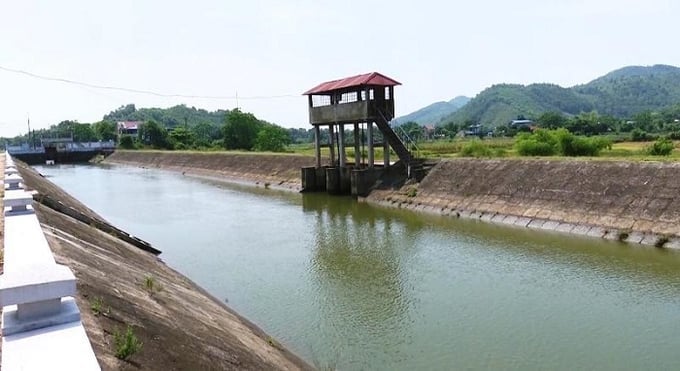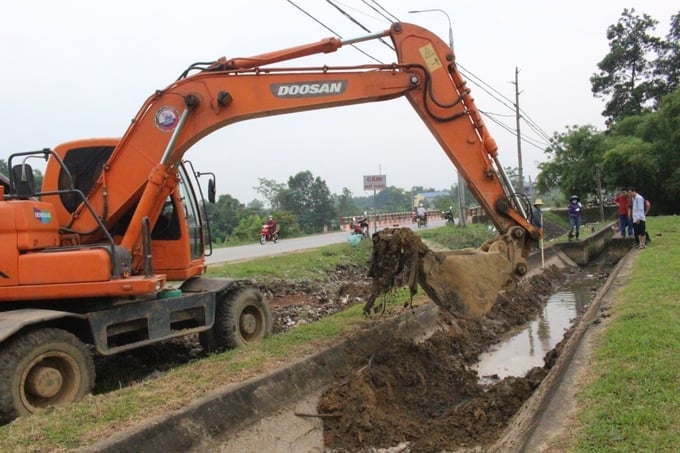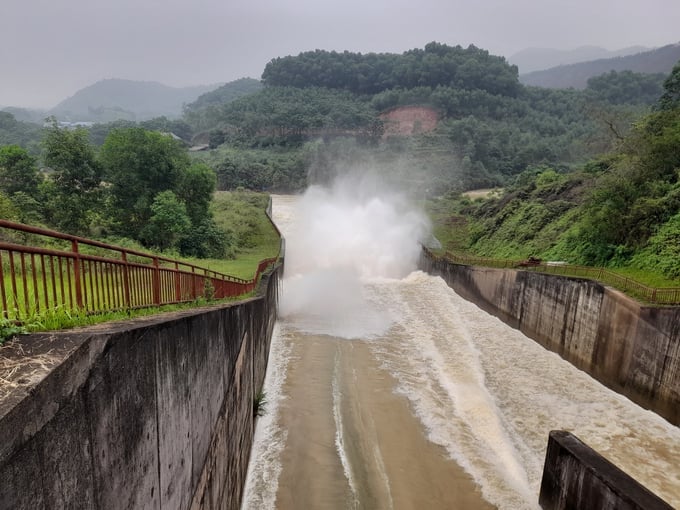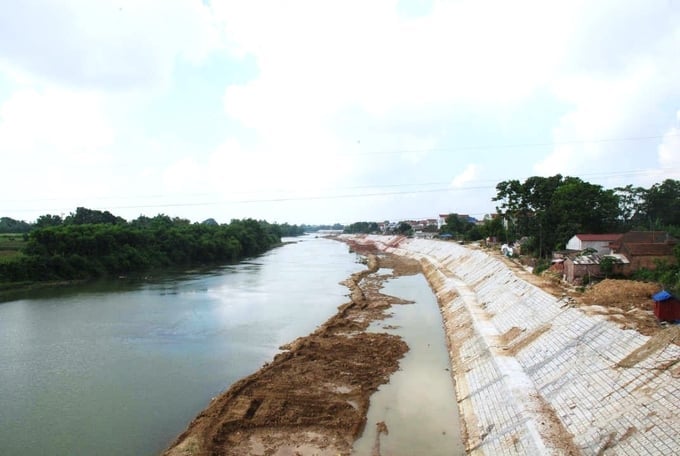May 29, 2025 | 08:06 GMT +7
May 29, 2025 | 08:06 GMT +7
Hotline: 0913.378.918
May 29, 2025 | 08:06 GMT +7
Hotline: 0913.378.918

Thai Nguyen province is focused on investing in the construction and reinforcement of local irrigation structure system to proactively manage irrigation water sources, thereby effectively meeting the demands of agricultural production. Photo: Pham Hieu.
In addition to providing support for the local residents with regards to crop varieties and the scientific-technical aspects of crop and livestock production, Thai Nguyen province has prioritized investment in the construction and reinforcement of local irrigation structure system to proactively manage irrigation water sources, thereby effectively meeting the demands of agricultural production.
According to the residents of Thanh Ninh commune, Phu Binh district, the commune previously utilized a pump station called Doi Thong. However, due to prolonged use, the pump was damaged, and local residents were forced to use family-owned pumps and draw water from the stream to irrigate their fields. The manual pumping process added further challenges to the already strenuous agricultural work.
"With support from the government, the commune has constructed a pump station with a robust water irrigation canal system since 2022, thereby effectively meeting the irrigation needs of the local fields. Consequently, the rice crops are thriving on the 10-hectare field, bringing immense joy to the local farmers," shared Mr. Nguyen Van Huyen residing in Thanh Ninh commune, Phu Binh district.

Canal dredging and irrigation structure upgrading in Phu Binh district. Photo: Pham Hieu.
With the aim of ensuring irrigation water for the spring crop of 2024, the local governments of Thai Nguyen province have actively stored and conserved water at irrigation structures. According to assessments by specialized agencies, the level of water reserves in multiple reservoirs across the province is sufficient to serve the upcoming winter and spring crops.
Following the construction of the Nam Huong dam in Thanh Ninh commune, Phu Binh district, which recently received investment in 2022, water extraction for the production of 50 hectares of rice in six hamlets across Thanh Ninh and Luong Phu has become more convenient. Before the end of the current rice harvest, the water at Nam Huong dam has been adequately stored by the Phu Binh Irrigation Exploitation Station under the Thai Nguyen Irrigation Exploitation Company Limited to support the upcoming spring crop.

The level of water reserves in multiple reservoirs across Thai Nguyen province range from 60 to 100% of their designed capacity, which meets future basic production. Photo: Pham Hieu.
Thanks to recent the support and investment from various levels of government, approximately 18 kilometers of the canal network in Uc Ky commune, Phu Binh district has been reinforced, thereby meeting the irrigation needs for 250 hectares of rice production area.
"After the government constructed a new concrete canal in 2021, I no longer have to rely on a manual pump, and water could flow directly into the fields. Thanks to this, the rice crops have grown well, with no concerns about water shortage during the dry season," shared Mr. Duong Van Hung, a local resident.
In addition to the Nam Huong dam, Thai Nguyen Irrigation Exploitation Company Limited has invested in repairing, upgrading, and constructing 11 irrigation structures in Phu Binh district between 2021 and 2023. The company has entrusted the Phu Binh Irrigation Exploitation Station to manage 16 reservoirs, 2 flood dams, and nearly 30 kilometers of canal networks. The station's facilities provide irrigation water for over 3,500 hectares of rice and 700 hectares of winter crops across 15 local communes and towns.
According to the Phu Binh district's Department of Agriculture and Rural Development, existing irrigation structures within the province can currently meet irrigation needs, serving agricultural production for local residents. As a result, the district has developed various production models with gradually increasing scale and quantity, thereby moving towards commodity agriculture. Furthermore, concentrated and specialized rice production fields have also been established within the district.

Phu Binh district has invested over 27 billion Vietnamese dong in the construction, repair, and upgrade of local irrigation structures since 2021. Photo: Pham Hieu.
Phu Binh district currently has 106 reservoirs and dams, 38 pumping stations, and over 610 kilometers of canal networks. With support from the provincial government since 2021, the district has invested over 27 billion Vietnamese dong in the construction, repair, and upgrade of irrigation structures across various communes and towns, effectively meeting the irrigation needs for over 12,000 hectares of rice production areas.
Tasked with managing 200 irrigation structures, which include 90 water reservoirs, 103 flood dams, 7 pumping stations, and 248 kilometers of various canal networks, and providing irrigation water for over 16,000 hectares of rice production area, the Thai Nguyen Irrigation Exploitation Company Limited has been actively storing and conserving water in its reservoirs. On average, the level of water reserves in multiple reservoirs across the province currently reaches 60 to 80% of their designed capacity.
In addition to regular inspection, maintenance, and repair of irrigation structures, the company also develops water regulation plans for reservoirs and flood dams after the rainy season to ensure both flood control capacity and sufficient water storage for agricultural production. With the current state of local water resources and rainfall, the company expects to ensure an adequate water supply for the winter crop in 2023 and the spring crop in 2024.
Translated by Nguyen Hai Long
/2025/05/25/4127-3-073637_820.jpg)
(VAN) Thanks to the promotion from an FAO-implemented project, vegetable production in greenhouses in Moc Chau has seen strong development, from 1.5 hectares in 2021 to nearly 50 hectares in 2024.

(VAN) FAO has recently supported USD 140,000 to implement the project 'Risk mitigation human-animal interface risks through disease control initiatives in pig farming.'

(VAN) The People's Committee of Tra Vinh province has approved an adjustment to the investment policy for the Green Hydrogen Plant project, increasing its area to approximately 52.76 hectares.
![Reducing emissions from rice fields: [2] Farmers’ commitment to the soil](https://t.ex-cdn.com/nongnghiepmoitruong.vn/608w/files/news/2025/05/05/dsc08881jpg-nongnghiep-140632.jpg)
(VAN) Clean rice cultivation model in Thuong Tan commune, Bac Tan Uyen district, is assisting local residents in achieving sustainable agriculture by substantially reducing costs, increasing productivity, and protecting the environment.

(VAN) At the conference to disseminate Resolution No. 68, AgriS introduced its digital agricultural ecosystem and reaffirmed its commitment to accompanying the Government in promoting private sector development and sustainable agriculture.

(VAN) 'Blue Ocean - Blue Foods' initiative is designed to restore marine ecosystems and establish sustainable livelihoods for local communities by cultivating a minimum of 1,000 hectares of cottonii seaweed in the first three years.
/2025/05/21/4642-3-112707_603.jpg)
(VAN) The V-SCOPE project has made direct contributions to three out of six pillars of the Comprehensive Strategic Partnership between Vietnam and Australia.